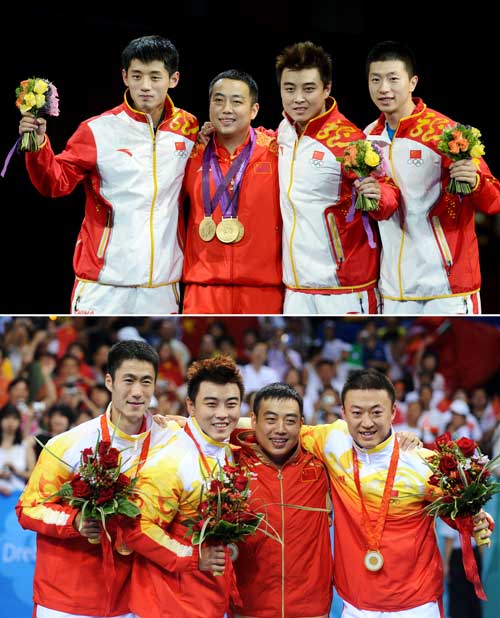China remains dominant in table tennis
 0 Comment(s)
0 Comment(s) Print
Print E-mail Xinhua, August 9, 2012
E-mail Xinhua, August 9, 2012
|
|
|
Up: (L-R) Zhang Jike, coach Liu Guoliang, Wang Hao and Ma Long of China attend victory ceremony of men's table tennis team competition, at London 2012 Olympic Games in London, Britain, on August 8, 2012. China won gold medal. [Wang Qingqin/Xinhua] Down: (L-R) Wang Liqin, Wang Hao, coach Liu Guoliang and Ma Lin of China attend victory ceremony of men's table tennis team competition, at Beijing 2008 Olympic Games in Beijing, China, on August 18, 2008. China won gold medal. [Xu Jiajun/Xinhua] |
Despite all the changes made to the rackets, rules and competition formats, China's dominance in table tennis was not weakened a bit. In London, China once again showed the world how deep the country's depth is in this sport.
China took away all possible medals in the Olympic table tennis competition here Wednesday, living up to the expectations of fans in the world's most populous country who view the sport as a matter of national pride.
The table tennis superpower steamrolled all opponents in London to claim two teams titles and occupy the top two places in both the men's and women's singles events.
What looks auspicious to the Chinese, but perhaps ominous to the opponents, is that such achievements were made by a team of young players, four of whom were attending the Olympics for the first time.
Shi Zhihao, head coach of China's women's team, and Liu Guoliang, head coach of China's men's team, made similar comments at the end of the Olympic tournament, saying that the London Games showed the coming-of-age of China's young players.
"I believe in the next four to eight years, Chinese players will become even more powerful," Shi said.
In London, China's Li Xiaoxia, 24, and Ding Ning, 22, won the gold and silver medals in women's singles. The top two places of men's singles were occupied by Zhang Jike, 24, and Wang Hao, 28. Guo Yue, 24 and Ma Long, 23, joined their teammates to win the men's and women's teams titles.
China's women players have maintained a perfect record in the sport at the Olympic Games, winning all gold medals available from the Barcelona 1992 to the London 2012.
The men's team also kept a glittering record, missing gold medals only twice during the past two decades, one in Barcelona and another in Athens. Sweden's Jan-Ove Waldener and South Korea's Ryu Seung-Min claimed the men's singles gold medals at the two Games.
The overwhelming dominance of China in the sport has sprouted rumors that the rules changes in the International Table Tennis Federation (ITTF) are meant to lessen the dominance of the Chinese players.
Previous changes include the elimination of hidden service, the ban of speed glue and the use of larger balls. Most recently, the ITTF altered its rules for the London Games, allowing only two players from one nation to enter the singles, eliminating the possibility of another 1-2-3 finish for Chinese men and women as they did in Beijing.
ITTF President Adham Sharara, however, said the changes are meant to make the sport more appealing and popular worldwide.
Sharara said China didn't win the gold medals in London as easily as it did in Beijing. The new rules might have been a reason, but most importantly, it was because the other countries were doing the catch-up.
Taking Japan for example, Sharara said the Japan's women team, which, led by 19-year-old Kasumi Ishikawa and 24-year-old Ai Fukuhara, finished second in the women's team events in London, getting Japan its first Olympic medal in table tennis in history. Ishikawa, now already world number six, was attending the Olympics for the first time.
The German players are also getting stronger. Germany won men's teams bronze medal in London. During the men's teams semifinals, Germany's Timo Boll beat world number one Zhang Jike 3-1.
Sharara said Germany has Boll and Dimitrij Ovtcharov, who won the London singles bronze medalist. If the third player could get a little bit stronger, it will be a very strong team.
"Maybe at the next World Championships, it will be very interesting to watch," he said.
A huge advantage China has come from its systematic training scheme and huge efforts in grooming young players. Now other countries are doing the same thing. France is one of them.
Sharara said France set up a plan to train young table tennis players five years ago, aiming to have a place in the sport.
"Now the young French players are already the best in Europe at the junior level. They are very talented and have very good imagination. As a group, in the future they will challenge China," Sharara said.
China is well aware of the challenges it is facing.
Liu Fengyan, vice-chairman of the Chinese Table Tennis Association, said China has been a target of other countries and it will be increasingly difficult for China to keep an overwhelming dominance.
"No team can win all the time. This is the law of competitive sports. But table tennis is the sport that people in China care most. We have to live up to the public expectation. We cannot afford to lose," he said.







Go to Forum >>0 Comment(s)